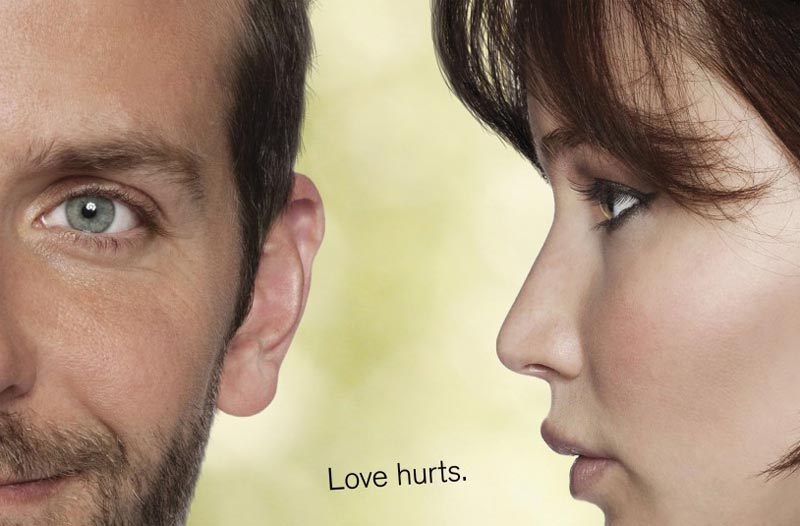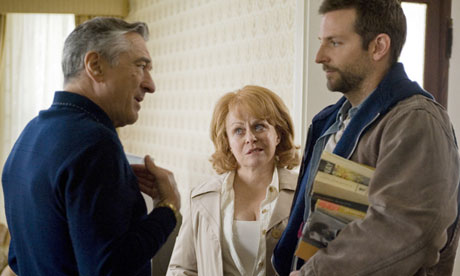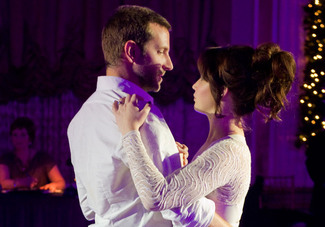Silver Linings Playbook could be the worst representation of a film by trailers ever. I didn’t think I would particularly enjoy it (but am cursed by a need to see all Oscar-nominated films), but five minutes into it I realised that I read the book (by Matthew Quick) four years ago and loved it.
Maybe my memory is going and I should have remembered the title, but being as they changed the lead character’s name and ethnicity, the importance of the minor characters (who are truly minor in the novel), the ending and the whole point of the story, it may not be quite so surprising. I still liked the film – very loosely based on the novel – but the question remains; did Jennifer Lawrence deserve that Oscar for best actress?
The answer is possibly, but no more so than Bradley Cooper as best actor, but then, the Academy had already decided to give that to Daniel Day Lewis in Lincoln, which meant the best aspect of this film went unrewarded. Cooper plays Pat Solatano Jnr., who checks out of a mental health institution against medical advice. He was committed after assaulting his wife’s lover and has served his sentence, but has also been diagnosed with bi-polar disorder.
One of the conditions of his release is that he moves home with his parents – father Pat Snr. is a study in OCD played by Robert de Niro, while mother, Dolores, is an anxious conciliator played by Jacki Weaver. Pat Jnr. has a couple of ambitions: to get back his old job as a substitute teacher, and to get back with his ex-wife, Nikki. He believes he can accomplish his goals through healthy living (he runs every day) and positive thinking, looking for silver linings in every situation, and remaking himself by avoiding negativity, “a poison like nothing else”.
In keeping with his new up-beat mentality, Pat Jnr. reads only the books on the English language syllabus that have happy endings – he throws Hemingway out of the window. Neither does he approve of Lord of the Flies in which he deplores that humanity is nasty, and there are no silver linings. Even if he weren’t suffering a mental illness, he would find it tough to remain resilient in the face of his brother, Jake’s (Shea Whigham) insistence on talking of all the things that are going right for himself and wrong for Pat Jnr.
He also worries about his father’s commitment to the Philadelphia Eagles, who seem to suffer from an inferiority complex, getting close to success and then blowing it. Pat Snr. attempts to control the results of the games through various rituals with handkerchiefs and envelopes. The sport, however, is the way that they bond, and, although his father has been banned from the stadium, they go to watch a game together, with Dolores’ advice to, “Don’t drink too much; don’t fight anybody.”
His old friend, Ronnie (John Ortiz), invites him to dinner with his domineering wife, Veronica (Julia Stiles) and her sister, Tiffany (Jennifer Lawrence), dealing with her husband’s death through reckless promiscuity. If this is supposed to offer an alternative home scenario, it is not a particularly appealing one. Everyone has problems and is undergoing a variety of therapy. Ronnie goes to the garage when he gets angry, where he plays loud music and punches things to work out his aggression.
Besides sex, Tiffany uses dance as a physical outlet. She is the first to admit, “I’m not that great a dancer, but who cares – it’s therapy and I like it” She needs a partner to perform a routine, so she teaches Pat Jnr to dance, sharing intimacy and touch. More than the necessary steps, he learns to let go of the past and painful memories and begins to live in the present, assimilating valuable lessons of focus, collaboration and discipline.
Pat Jnr knows that he lacks a filter when he talks, which allows him to ask inappropriate questions no one else would broach. While this can be awkward, it also leads to occasional humorous circumstances. Yes, this film is actually billed as a romantic comedy, in defiance of all categorising constructs. Who knew that restraining orders, neuroses, grievous assault, pain, anger and sorrow were funny? The mother, father, and son trio form a lonely and dysfunctional unit, which seems unlikely to provoke laughs.
The camera-work is hand-held jerky although at the low end of the nausea scale, and the direction (David O. Russell) is light although slightly inconsistent. Russell also wrote the screenplay and he has made the main characters much more likeable and ‘fixable’. There are some continuity issues with costume and jewellery, but I’m prepared to overlook them for the mostly fabulous soundtrack featuring a range of great music from the Clash and the White Stripes through to The Stranglers and the Sex Pistols.





2 comments:
I asked myself the same question last February: Why did Jennifer Lawrence get the oscar for Best Actress? I can only conclude that, without fail, once the Academy neglects to award an actor for their outstanding work, they shortly follow it up by awarding the person an Oscar when the performance didn't merit it, but their star power is still at megawatts. (E.g. Jen should have gotten it for Winter's Bone and even The Hunger Games but didn't so they awarded it to her for this over-the-top business).
And though I enjoyed the movie, it was completely predictable and didn't deserve Best Picture nominee status but that's another discussion...
Very true, Erika.
I actually saw it in February too (and have only just got round to typing up my notes) and I would have to agree with your conclusion. I thought Jennifer Lawrence was fabulous in Winter's Bone although I've not seen The Hunger Games because I've not read it yet.
Although I have long since given up trying to understand the reasoning behind the Academy's choices for Best Picture nominations, I still try and watch them all, just to keep up with the zeitgeist. It's an affliction, but a relatively harmless one...
Kate x
Post a Comment